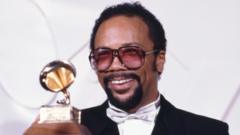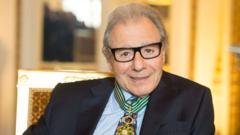Quincy Jones lived for over 50 years after his friends prepared a memorial concert for him, believing his survival from a brain aneurysm in 1974 was unlikely. At just 41, Jones had already made significant contributions to music as a performer, arranger, songwriter, and producer. Initially starting in the vibrant jazz scene of the 1950s, he would achieve widespread acclaim with iconic recordings for legends such as Dinah Washington, Frank Sinatra, and Lesley Gore.
Despite the grim circumstances surrounding his 1974 aneurysm, Jones’s memorial concert went on, and he attended under strict instructions from his neurologist to remain calm while beloved entertainers like Marvin Gaye and Richard Pryor paid tribute. The concert demonstrated the breadth of Jones's influence, which only grew in the years that followed through partnerships with Michael Jackson, contributions to charitable projects like "We Are the World," and work with numerous hip-hop artists.
Growing up in 1930s Chicago during the Great Depression, Jones faced adversity early in life, with a troubled family background and brushes with gang violence. A pivotal moment came when he discovered a piano in a community center, leading him to reject a life of crime for music. Nature and nurture converged, as his musical talent drew him into illustrious circles; he formed connections with Quentin Tarantino, Billie Holiday, and was mentored by the likes of Count Basie.
His career flourished with notable achievements, including becoming the first African-American vice president of a major record label and producing golden hits that helped define pop and R&B in the 1980s. His collaborations with Michael Jackson on albums like "Off the Wall" and "Thriller" reshaped the music industry, while his volunteerism and advocacy for civil rights remained strong throughout his life.
Despite personal challenges, including multiple marriages and health issues, Jones remained a fixture in the music world. His innovative approach to music production embraced evolving genres, including hip-hop, resounding with a generation of artists who revered him as a trailblazer. His recent passing at age 91 marks the collective loss of a visionary who tirelessly worked to bridge music and social change. As the world mourns his legacy, there's hope for another memorial concert that honors his extraordinary contributions to music and humanity.





















